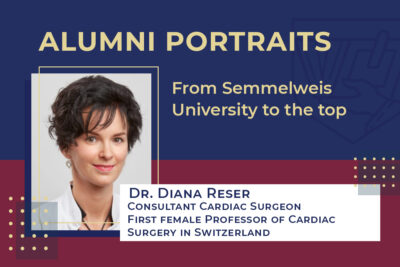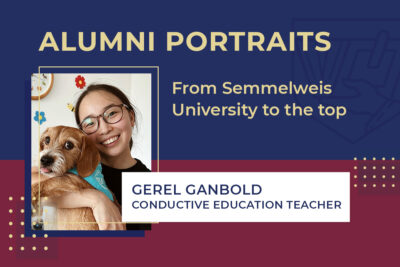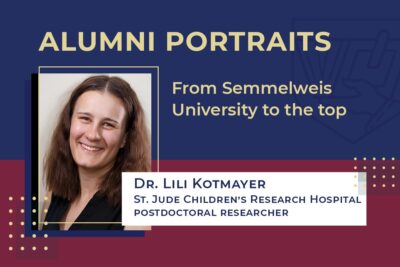Why did you choose to become a dentist?
I was interested in the medical profession and biology itself from the beginning. I have always wanted to go in that direction to further my studies. I felt it was something I could really achieve something in. My father was also a dentist, and he was my role model; in fact, I became a dentist mainly thanks to him. If it hadn’t been for that, I would probably have gone into some other medical field.
Was there anyone you looked up to?
My father was an excellent professional: he was the head of the department of prosthodontics in Târgu Mures. He was a great role model for me, both professionally and as a person, and of course a great motivator. There were also many doctors and dentists around us, which probably influenced my career choice, after all.
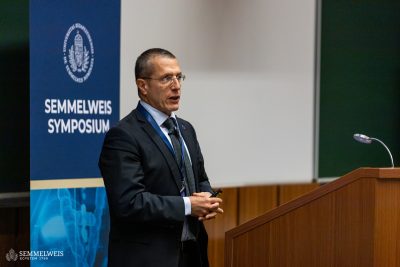 What was your most memorable experience at Semmelweis University? Are there moments that you still look back on fondly, after all these years?
What was your most memorable experience at Semmelweis University? Are there moments that you still look back on fondly, after all these years?
The first two years were not the easiest, but probably all students are aware of that. Anatomy and physiology are quite difficult subjects, but I was highly interested in those two. I also worked as a demonstrator at the Institute of Anatomy for more than 3 years, namely the third, fourth and fifth years of my studies. This was fundamental for my further activities, as I was mainly interested in surgical fields such as oral surgery and periodontology. It was a lasting experience for me when I worked in the laboratory of Károly Csányi, an assistant professor at the Institute of Anatomy, around the time when Professor János Vajda was head of department. I helped them in the preparation of their anatomy atlas, in which, besides drawings, live specimens were also presented. (Unfortunately, the book Metszetanatómia is no longer available in Hungary.) I began to like oral surgery at the institute of Professor Szabó. What proved to be decisive for me was periodontology in the fourth year, under the guidance of Professor Gera. Then I continued to work with Professors Windisch and Győri, and over time we developed a close relationship.
How did your career develop after graduating from university?
When I first worked in a dental office with my father, I acquired a good basis for further professional development. After that I continued my studies in Denmark, at the Royal Dental College in Aarhus, where I had the opportunity to study under a world-renowned professor, Thorkild Karring. He is credited with several modern techniques, such as how to build a bone. He was a very innovative man and you could learn a lot from him – including how to think critically. How to evaluate medical data correctly was also an important aspect. Which aspect is essential, which is less important, and in general: how to process information independently and with a critical mind.
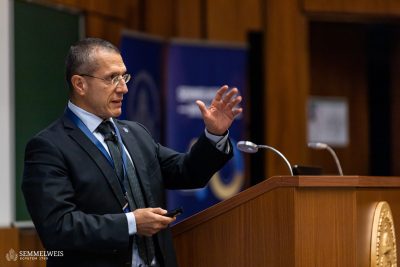 Do you have any hobbies that accompanied you throughout your studies or career? In what way did it help you?
Do you have any hobbies that accompanied you throughout your studies or career? In what way did it help you?
One of my main hobbies is sports. Besides swimming and running, I spend a lot of time in the gym, but reading is also an important leisure activity to me. I am not only interested in dentistry or medicine, but also in world literature, history and languages. I really like learning new languages because it can be beneficial in so many ways. I think the more languages you speak, the more cultures you open up to, which I believe to be an important aspect of my personality.
What advice would you give to current Semmelweis students about their university years and career?
I think the most vital thing is to find what you are most interested in within the field of medicine, and also to find the motivation to be the best you can be at it. If something captures all our attention, it’s worth developing in that direction. In this development, it is essential to have a mentor to guide us, someone from whom we can learn constantly. I think the secret to this profession is to have something that awakens the passion in us, and that we can develop in this direction with the right guidance.
Dr. Anton Sculean was awarded Doctor Honoris Causa (DHC) at Semmelweis University in 2008, and presented a lecture on translational research in regenerative periodontal surgery at the Semmelweis Symposium 2022, the university’s most prestigious international scientific event.
Alumni Directorate
Photo: Attila Kovács – Semmelweis Egyetem
